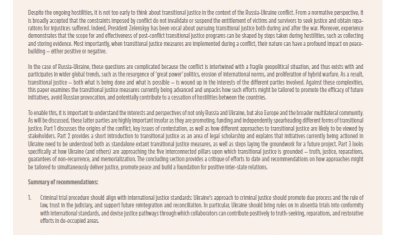New Book Clarifies the Modes of Liability for International Crimes


UN Photo
30 September 2019
[Version française ci-dessous]
Modes of liability and criminal responsibility in general, have been vigorously debated in academia and by legal practitioners for decades.
The most senior political and military figures in any given context are almost invariably not the people ‘pulling the trigger’. As such, questions on criminal responsibility are pertinent. Is a business executive complicit for genocide for trading chemicals with a regime suspected of using chemical weapons against civilians? Can a military commander be criminally liable when he or she did not commit crimes but failed to prevent them? To what extent are political leaders criminally liable for crimes committed by those in the lower echelons of government?
‘The sometimes highly technical questions that arise when a court has to determine how and why an accused may or may not be held liable for the crimes on which it has to adjudicate deserve a systematic and comprehensive study by scholars who have a deep knowledge of the legal challenges that arise in this operation’ explains Robert Roth, one of the Co-editors and former Director of the Geneva Academy.
Clarifying the Conditions of Accountability for War Crimes, Crimes against Humanity and Genocide
Jurisprudence in the various international criminal law (ICL) tribunals and national courts is inconsistent, both internally and across different tribunals, as illustrated by recent debates surrounding the complex notions of joint criminal enterprise – involving the participation of several individuals in a common criminal plan – or of command responsibility – when a superior is held responsible for international crimes committed by his subordinates and for failing to prevent or punish them. This has left the state of the law unclear, to the detriment of accountability and the ongoing struggle against impunity.
The new book Modes of Liability in International Criminal Law (Cambridge University Press) edited by Jérôme de Hemptinne, Robert Roth and Elies van Sliedregt precisely intends to clarify the conditions of accountability for international crimes.
‘As most domestic jurisdictions are using the same concepts as international tribunals, this book will be extremely useful to prosecutors, judges and attorneys representing accused or victims before national courts’ insists Robert Roth.
‘International criminal law has a crucial role in ensuring the enforcement and credibility of international humanitarian law and human rights, but it can only be effective and fair in practice with clear rules on who is liable for what. We are proud that this book marks an important step towards this important aim’ adds Marco Sassòli, Director of the Geneva Academy.
Under the Auspices of the Geneva Academy
The publication is based on research undertaken under the auspices of the Geneva Academy and was coordinated by Jérôme de Hemptinne (at the time Researcher at the Geneva Academy) and Robert Roth (at the time Director of the Geneva Academy). It is co-edited with Elies van Sliedregt (University of Leeds).
Geneva Academy’ alumni and Former Teaching Assistants, Antonio Coco and Tom Gal, as well as Thomas van Poecke and alumnus of our LLM also contributed to this volume.
Launch Events in The Hague and in Geneva
The book will be launched in the Hague and in Geneva, in the presence of ICL experts and the authors.
Une étude sur la responsabilité pénale pour crimes internationaux
Comment établir juridiquement la responsabilité du commandant qui néglige gravement de surveiller ses troupes ou de celui qui participe à une « entreprise criminelle » durant un conflit armé sans lui-même agir sur le terrain ? Ces questions traversent toute la jurisprudence rendue par les tribunaux pénaux internationaux depuis les procès de Nuremberg et de Tokyo (1946-1948). Elles préoccupent également les tribunaux nationaux appelés à se prononcer sur des crimes de guerre, des crimes contre l’humanité ou une participation à un génocide sur la base de leurs législations nationales.
Edité par les prestigieuses Cambridge University Press, l’ouvrage collectif Modes of Liability in International Criminal Law propose une analyse systématique et approfondie des divers modes de responsabilité admis et appliqués par les juridictions pénales internationales. Il est le fruit d’une recherche menée pour l’essentiel dans le cadre de l’Académie. Deux des trois éditeurs scientifiques ont un lien avec l’Académie: Robert Roth en a été directeur de 2014 à 2018; outre son activité de chercheur, Jérôme de Hemptinne y enseigne depuis plusieurs années. La troisième éditrice scientifique, Elies van Sliedregt, est professeur à l’Université de Leeds.
L’ouvrage fera l’objet d’une présentation et d’une discussion en présence des trois co-éditeurs scientifiques et de la professeure Poala Gaeta le 29 octobre à 18 h 30 à la Villa Moynier, siège de l’Académie.









